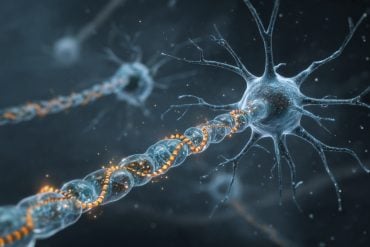Summary: Researchers identified 11 areas of DNA that were linked to depression in women and one in males. They also found depression was associated with metabolic disease in women, providing an important new aspect to consider when treating depressive symptoms.
Source: McGill University
Depression is widely reported to be more common in women than in men, with women twice as likely to receive a diagnosis than men.
A new sex-specific study from McGill University has found that there are differences between male and female genes and how they relate to depression.
In a study of more than 270,000 individuals, the researchers found that sex-specific prediction methods were more accurate in forecasting an individual’s genetic risk of developing depression than prediction methods that did not specify sex.
The researchers found 11 areas of DNA that were linked to depression in females, and only one area in males. They also found that depression was specifically linked to metabolic diseases in females, an important aspect to consider when treating women with depression.
Despite the biological processes involved in depression being similar in males and females, researchers found that different genes were involved for each sex. This information can be useful to identify future sex-specific treatments for depression.

“This is the first study to describe sex-specific genetic variants associated with depression, which is a very prevalent disease in both males and females. These findings are important to inform the development of specific therapies that will benefit both men and women while accounting for their differences,” says Dr. Patricia Pelufo Silveira, lead author and Associate Professor in the Department of Psychiatry.
“In the clinic, the presentation of depression is very different for men and women, as well as their response to treatment, but we have very little understanding of why this happens at the moment.”
About this genetics and depression research news
Author: Press Office
Source: McGill University
Contact: Press Office – McGill University
Image: The image is in the public domain
Original Research: Open access.
“A sex-specific genome-wide association study of depression phenotypes in UK Biobank” by Patrícia Pelufo Silveira et al. Molecular Psychiatry
Abstract
A sex-specific genome-wide association study of depression phenotypes in UK Biobank
There are marked sex differences in the prevalence, phenotypic presentation and treatment response for major depression. While genome-wide association studies (GWAS) adjust for sex differences, to date, no studies seek to identify sex-specific markers and pathways.
In this study, we performed a sex-stratified genome-wide association analysis for broad depression with the UK Biobank total participants (N = 274,141), including only non-related participants, as well as with males (N = 127,867) and females (N = 146,274) separately.
Bioinformatics analyses were performed to characterize common and sex-specific markers and associated processes/pathways.
We identified 11 loci passing genome-level significance (P < 5 × 10−8) in females and one in males. In both males and females, genetic correlations were significant between the broad depression GWA and other psychopathologies; however, correlations with educational attainment and metabolic features including body fat, waist circumference, waist-to-hip ratio and triglycerides were significant only in females.
Gene-based analysis showed 147 genes significantly associated with broad depression in the total sample, 64 in the females and 53 in the males.
Gene-based analysis revealed “Regulation of Gene Expression” as a common biological process, but suggested sex-specific molecular mechanisms.
Finally, sex-specific polygenic risk scores (PRSs) for broad depression outperformed total and the opposite sex PRSs in the prediction of broad major depressive disorder.
These findings provide evidence for sex-dependent genetic pathways for clinical depression as well as for health conditions comorbid with depression.






